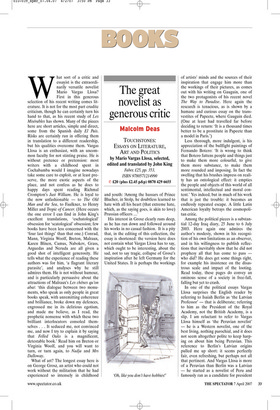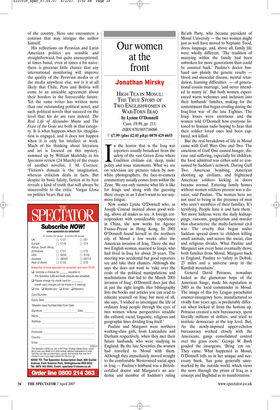The great novelist as generous critic
Malcolm Deas
TOUCHSTONES: ESSAYS ON LITERATURE, ART AND POLITICS by Mario Vargas Llosa, selected, edited and translated by John King Faber, £25, pp. 353, ISBN 9780571214990 ✆ £20 (plus £2.45 p&p) 0870 429 6655 What sort of a critic and essayist is the extraordinarily versatile novelist Mario Vargas Llosa? First in this generous selection of his recent writing comes literature. It is not for the most part erudite criticism, though he can certainly turn his hand to that, as his recent study of Les Misérables has shown. Many of the pieces here are short articles, simple and direct, some from the Spanish daily El País. Risks are certainly run in offering them in translation to a different readership, but his qualities overcome them. Vargas Llosa is an enthusiast, with an uncommon faculty for not stinting praise. He is without pretence or pretension: most writers with a childhood spent in Cochabamba would I imagine nowadays take some care to exploit, or at least preserve, the more exotic aspects of the place, and not confess as he does to happy days spent reading Richmal Crompton’s Just William. He is loyal to the now unfashionable — to The Old Man and the Sea, to Faulkner, to Henry Miller and Tropic of Cancer. (Here occurs the one error I can find in John King’s excellent translations, ‘eschatological’ obsession for ‘scatological’ obsession; few books have been less concerned with the ‘four last things’ than that one.) Conrad, Mann, Virginia Woolf, Breton, Malraux, Karen Blixen, Camus, Nabokov, Grass, Arguedas and Neruda are all given a good shot of intelligent generosity. He tells what the experience of reading these authors was for him, ‘a flagrant literary parasite’, and analyses why he still admires them. He is not without humour, and is particularly persuasive about the attractions of Malraux’s Les chênes qu’on abat: ‘this dialogue between two monuments, who speak as only people in great books speak, with unremitting coherence and brilliance, broke down my defences, engrossed me in its delirious egotism, and made me believe, as I read, the prophetic nonsense with which these two brilliant interlocutors consoled themselves . . . It seduced me, not convinced me, and now I try to explain it by saying that Felled Oaks is a magnificent, detestable book.’ Read him on Breton or Virginia Woolf, and you will want to turn, or turn again, to Nadja and Mrs Dalloway.
What of art? The longest essay here is on George Grosz, an artist who could not work without the militarism that he had experienced so intensely in childhood and youth: ‘Among the hussars of Prince Blucher, in Stolp, he doubtless learned to hate with all his heart (that extreme hate, which, as the saying goes, is akin to love) Prussian officers ...’ His interest in Grosz clearly runs deep, as he has run down and followed around his works in no casual fashion. It is a pity that, in the editing of this collection, the essay is shortened: the version here does not contain what Vargas Llosa has to say, which ought to be interesting, about the sad, not to say tragic, collapse of Grosz’s inspiration after he left Germany for the United States. It is perhaps the workings of artists’ minds and the sources of their inspiration that engage him more than the workings of their pictures, as comes out with his writing on Gauguin, one of the two protagonists of his recent novel The Way to Paradise. Here again the research is tenacious, as is shown by a humane and curious essay on the transvestites of Papeete, where Gauguin died. (One at least had travelled far before deciding to return: ‘It is a thousand times better to be a prostitute in Papeete than a model in Paris.’) Less thorough, more indulgent, is his appreciation of the bullfight paintings of Fernando Botero: ‘It is wrong to think that Botero fattens people and things just to make them more colourful, to give them more substance, to make them more rounded and imposing. In fact the swelling that his brushes impress on reality has an ontological effect: it empties the people and objects of this world of all sentimental, intellectual and moral content.’ Yes indeed, but in much of his work that is just the trouble: it becomes an endlessly repeated escape. A little Latin American loyalty betrays the cosmopolitan critic.
Among the political pieces is a substantial 12-day Iraq diary, 25 June to 6 July 2003. Here again one admires the author’s modesty, shown in his recognition of his own limitations as an observer, and in his willingness to publish reflections that inevitably show that he did not prophesy all that has come to pass who did? He does get some things right, for example his insistence on the disastrous scale and impact of the looting. Read today, these pages do convey an ominous sense of a society in free-fall, falling but yet to crash.
In one of the political essays Vargas Llosa surprises the English reader by referring to Isaiah Berlin as ‘the Latvian Professor’ — that is deliberate; referring to him as the President of the Royal Academy, not the British Academy, is a slip. I am reluctant to refer to Vargas Llosa himself as ‘the Peruvian novelist’ — he is a Western novelist, one of the best living, nothing parochial, and it does not seem altogether polite to keep harping on about him being Peruvian. This reference to Berlin’s Latvian origins pulled me up short: it seems perfectly fair, even refreshing, but perhaps not all that pertinent. And Vargas Llosa is more of a Peruvian than Berlin was a Latvian — he started as a novelist of Peru and famously ran as a candidate for president of the country. Here one encounters a contrast that may intrigue the author himself.
His reflections on Peruvian and Latin American politics are sensible and straightforward, but quite unexceptional, at times banal, even at times a bit naive: there is precious little chance that any international monitoring will improve the quality of the Peruvian media or of the media anywhere else, nor is it at all likely that Chile, Peru and Bolivia will come to an amicable agreement about their borders in the foreseeable future. Yet the same writer has written more than one outstanding political novel, and such political novels that succeed on the level that his do are rare indeed. The Real Life of Alejandro Mayta and The Feast of the Goat are both in that category. It is what happens when his imagination is engaged, and it does not happen when it is only his intellect at work. Much of his thinking about literature and art is focused on this mystery, summed up by William Skidelsky in his Spectator review (24 March) of the essays of another novelist, J. M. Coetzee: ‘Fiction’s domain is the imagination, whereas criticism deals in facts. But despite its basic falsity, fiction at its best reveals a kind of truth that will always be inaccessible to the critic.’ Vargas Llosa on politics bears that out.



































































 Previous page
Previous page